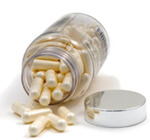 Consult your health care provider before taking herbal remedies. Herbs can interact with your medications and may be harmful for certain health conditions or medical procedures. When you see your doctor, be sure to inform him/her of which herbs you are taking.
Consult your health care provider before taking herbal remedies. Herbs can interact with your medications and may be harmful for certain health conditions or medical procedures. When you see your doctor, be sure to inform him/her of which herbs you are taking.
- Do not assume a product is safe or effective. Herbs are not overseen by a federal regulatory agency for guarantee of quality control or safety. Herbs may not contain the content that is claimed on the label, and may contain harmful substances that are not listed on the label.
- Although touted as natural and safe, herbs act as drugs but often lack appropriate scientific study.
- If you buy herbs, purchase them from a reliable source. Labels should include ingredient list, precautions, manufacturer's name and address, batch or lot number, manufactured date, expiration date and dosage information.
- Choose hersb that have been certified by a reputable third party testing company.
- Do not take herbal supplements in place of your current medications.
- Introduce one herb at a time to monitor how well the supplement is working and side effects. Using multiple herbal supplements puts you at a greater risk for side effects and medication interactions.
- Do not give herbs to infants or young children.
- Do not take herbs if you are pregnant, nursing or planning a pregnancy.
- Use extreme caution with herbs purchased in other countries or through mail order.
- Herbs can be part of an overall health maintenance program. Before taking any herbs, investigate the product thoroughly.
- Check with your doctor, pharmacist or dietitian to be certain any herbs you are taking will not interact with other medications.
Reliable sources to learn more about herbal therapy include:
This information has been approved by Alexandra Wilson, RD, and Michelle MacDonald, RD (January 2014).